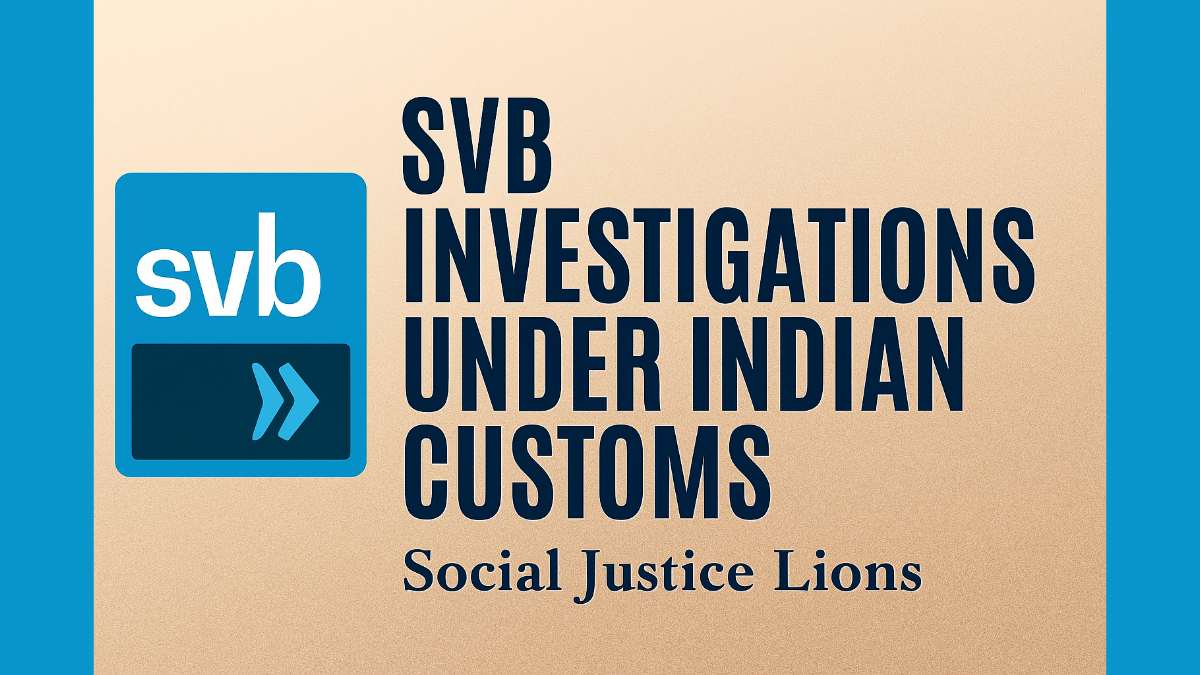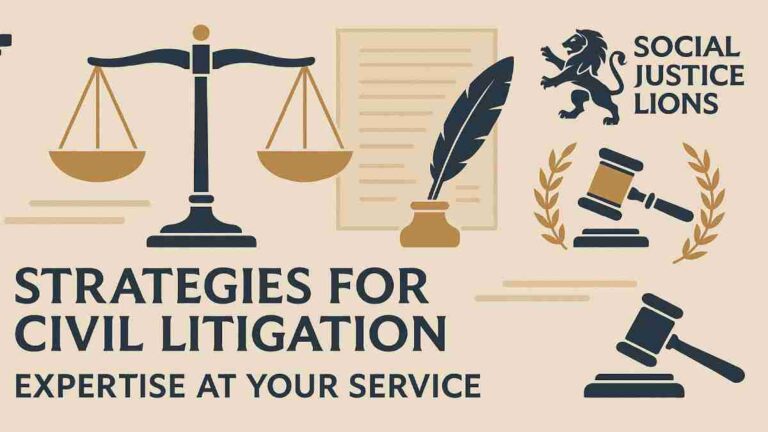SVB Investigations under Indian Customs: Compliance Strategies for Importers and Related Parties
International trade plays a vital role in India’s growing economy. Thousands of importers and multinational corporations rely on smooth customs procedures for business continuity. However, when imports involve related party transactions, the Special Valuation Branch (SVB) of Indian Customs comes into the picture. SVB investigations ensure that import values are not influenced by relationships between the buyer and seller.
For importers, facing an SVB investigations can be complex and time-consuming. Yet, with proper legal guidance and a sound compliance strategy, businesses can navigate these inquiries effectively. At Social Justice Lions, we specialize in helping importers, exporters, and multinational companies manage SVB compliance, transfer pricing alignment, and customs valuation issues with confidence.
SVB Investigations under Indian Customs: Compliance Strategies for Importers and Related Parties: Social Justice Lions
Understanding SVB and Its Purpose
The Special Valuation Branch (SVB) is a specialized unit of the Indian Customs Department. It handles cases where imports take place between related parties as defined under Rule 2(2) of the Customs Valuation (Determination of Value of Imported Goods) Rules, 2007.
The primary objective of SVB is to ensure that the transaction value declared by importers reflects the true value of goods. In other words, SVB verifies that the price paid for imported goods is not influenced by any special relationship between the buyer and seller.
SVB investigations typically apply when there is:
- A parent-subsidiary relationship between companies
- Joint venture or collaborative agreements
- Technical assistance or royalty payments linked to import pricing
- Brand usage or trademark agreements influencing product valuation
Why SVB Investigation Is Initiated
When the Customs authorities suspect that the declared value of imported goods may not represent the true transaction value, they refer the matter to SVB. The investigation is meant to prevent under-valuation or over-valuation, both of which can impact customs duty and tax liabilities.
Common triggers include:
- Imports from a foreign affiliate or associated enterprise
- Royalty or license fee payments connected to the import
- Use of common directors or management between importer and exporter
- Imports covered under technical collaboration agreements
- Cases where pricing mechanisms appear non-standard
By examining these factors, SVB ensures transparency, prevents revenue leakage, and maintains fairness in international trade transactions.
The SVB Investigation Process
SVB investigations follow a structured process under Customs law. The process usually begins when the Assessing Officer at the port suspects a related party influence on import pricing.
- Reference to SVB:
The assessing officer refers the case to the SVB for detailed examination. - Questionnaire and Document Submission:
The importer is required to file detailed documentation such as:- Company registration certificates
- Shareholding patterns
- Copies of agreements with foreign suppliers
- Pricing policies and transfer pricing reports
- Details of royalties, commissions, or management fees
- Provisional Assessment:
While the SVB review is in progress, the goods are cleared under provisional assessment with a bank guarantee or bond as security for differential duty. - Valuation Review:
SVB analyzes the relationship between the parties, transaction structure, and pricing terms. It checks whether such relationships affect the declared value. - Final Order:
After reviewing all evidence, the SVB issues an Order-in-Original (OIO) confirming whether the declared value is acceptable or requires adjustment.
This order becomes binding on the importer and Customs authorities until circumstances change or a review is sought.
Legal Framework Governing SVB
The SVB operates under the Customs Valuation (Determination of Value of Imported Goods) Rules, 2007, read with Section 14 of the Customs Act, 1962.
Key provisions include:
- Rule 3: Transaction value as the primary method of valuation
- Rule 12: Power of Customs to doubt the truth or accuracy of the declared value
- Rule 2(2): Definition of “related party”
- Rule 9: Adjustments to value for commissions, royalties, and license fees
These rules align with the WTO Valuation Agreement, ensuring India’s valuation practices follow global standards.
Common Challenges Faced by Importers
Many importers find SVB proceedings challenging due to procedural complexity and documentation demands. Frequent issues include:
- Delays in provisional assessment finalization
- Excessive bank guarantees blocking working capital
- Ambiguity in royalty or license fee treatment
- Overlap between transfer pricing and customs valuation
- Inconsistent interpretations by different customs zones
Moreover, non-compliance can lead to penalties, reassessment of duty, interest, and even confiscation of goods. Therefore, proactive legal and financial planning is essential.
Compliance Strategies for Importers
Importers can significantly reduce risks by adopting proper compliance strategies before, during, and after SVB investigations.
- Conduct a Relationship Review
Identify whether your foreign supplier qualifies as a “related party.” Evaluate any agreements, ownership structures, or shared control mechanisms that may trigger SVB scrutiny. - Prepare Comprehensive Documentation
Maintain detailed and updated documents such as inter-company agreements, pricing justifications, cost breakdowns, and transfer pricing documentation. - Ensure Consistency with Transfer Pricing Reports
Customs valuation and transfer pricing, though distinct, should align logically. Inconsistencies can raise red flags. - Obtain Legal Consultation Early
Engaging experienced customs lawyers helps ensure that submissions comply with SVB requirements. Legal experts assist in drafting replies, attending hearings, and negotiating favorable terms. - Maintain Transparency and Timely Communication
Respond to all SVB queries promptly and honestly. Non-disclosure or delays can prolong investigations or result in adverse findings.
Coordination between Transfer Pricing and Customs Valuation
Many importers misunderstand the relationship between transfer pricing under Income Tax law and customs valuation under Customs law. Although both concern pricing between related parties, their objectives differ.
- Transfer pricing focuses on ensuring that income is properly reported and taxed in India.
- Customs valuation ensures that import duties are correctly assessed on goods entering the country.
Hence, documentation under both domains must be harmonized. SVB officers often refer to transfer pricing studies to verify whether declared import values reflect market reality.
Legal professionals ensure consistency between these reports and help avoid double scrutiny.
How Legal Experts Help in SVB Investigations
Legal experts play a crucial role throughout the SVB process. Their responsibilities include:
- Advising importers on whether a case warrants SVB registration
- Drafting responses to customs notices
- Representing clients in hearings before SVB and Customs authorities
- Filing appeals before the Commissioner (Appeals) or CESTAT in case of adverse orders
- Negotiating the release of bank guarantees or bonds after order finalization
A well-prepared legal approach minimizes exposure to penalties and ensures compliance with statutory timelines.
Impact of SVB Findings on Businesses
SVB orders can significantly influence a company’s import pricing strategy. If SVB accepts the declared transaction value, it sets a positive precedent for future imports.
However, if the declared price is rejected, importers must pay differential duty, interest, and possibly penalties. Such findings also affect accounting entries, transfer pricing policies, and long-term supplier contracts.
Therefore, businesses must treat SVB investigations not just as a compliance exercise but as a key element of corporate governance and financial planning.
Best Practices for Smooth SVB Compliance
To manage SVB compliance effectively, importers should:
- Maintain robust internal documentation systems
- Conduct annual reviews of related party transactions
- Keep all customs correspondences properly archived
- Appoint a dedicated compliance officer or legal advisor
- Schedule regular training sessions for staff on customs procedures
Adhering to these best practices promotes transparency and builds credibility with Customs authorities.
Frequently Asked Questions
An SVB investigation ensures that the declared value of imported goods between related parties is genuine and not influenced by their relationship. It helps Customs authorities verify that the transaction value reflects the actual price paid or payable for the goods. The goal is to prevent undervaluation or overvaluation, which could affect customs duties and government revenue.
An importer is referred to the Special Valuation Branch when the supplier is a related entity, such as a parent company, subsidiary, or joint venture partner. This also applies if there are royalty payments, technical collaboration agreements, or brand usage arrangements linked to the import. Customs initiates SVB review to ensure fair valuation in such cases.
Importers must submit documents including the company’s incorporation details, shareholding pattern, related party agreements, pricing policies, royalty or license fee details, and transfer pricing reports. Proper documentation supports the importer’s case and helps avoid delays or additional scrutiny.
Typically, the SVB investigation process takes around six to nine months. However, the duration may vary depending on the complexity of the case and the completeness of the documentation provided. During the investigation, goods are usually cleared provisionally against a bond or bank guarantee.
Importers should maintain transparent records, respond promptly to SVB queries, and seek expert legal guidance. Aligning customs valuation with transfer pricing documentation and cooperating fully with Customs authorities ensures smoother proceedings and minimizes compliance risks.
Conclusion
SVB investigations under Indian Customs may seem daunting, but they are an essential part of ensuring fair trade valuation. Importers dealing with related parties must approach these investigations strategically. Proper documentation, legal representation, and proactive compliance can transform a potential challenge into an opportunity for stronger financial and regulatory alignment.
At Social Justice Lions, we guide importers through every step—from SVB registration to final order compliance. With our expertise in customs law, transfer pricing, and international trade, we help clients safeguard their business interests while maintaining full regulatory transparency.
In today’s global trade environment, compliance is not just a legal requirement—it is a business advantage. When companies act with integrity and precision, they not only meet SVB standards but also build trust with stakeholders and regulators alike.
Read More
- Advocates for Your Rights: Solicitors at Your Service
- Guidance in Real Estate Law: Building Your Future Together
- Product Liability Matters: Trust Our Expertise
- Supportive Approach to Personal Injury Cases: We’ve Got Your Back
- Protecting Your Intellectual Property: Trust Our Expertise
- Directorate General of Valuation (DOV) – About SVB







